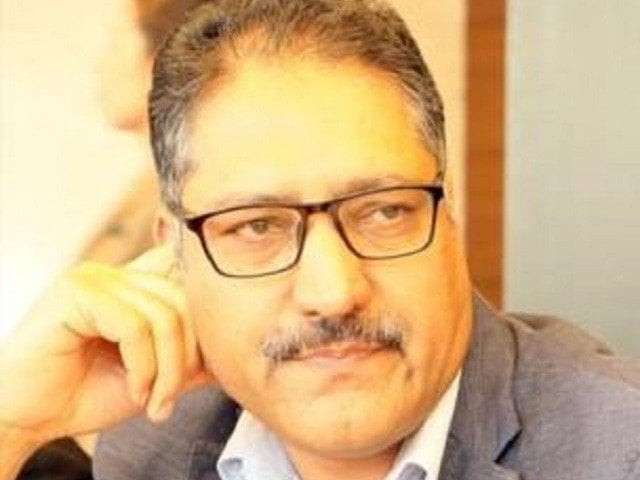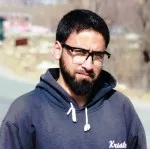I was not far away from where the incident occurred. I was in the newsroom, where I along with rest of the staff was working on Friday’s edition of our newspaper when we heard gunshots. Panic gripped us, but one of my colleagues mentioned that it couldn’t have been gunshots, Eid was nearing, and maybe kids were out playing with firecrackers. Thinking he was probably right, we resumed our work. But 20 seconds were enough to prove my colleague wrong; they were in fact actual gunshots.
My editor called only to deliver the bad news that Bukhari was shot outside his office along with his two security guards. In that moment, I recalled those loud bangs we had just heard and connected the dots. Bukhari was my editor’s old friend and he delivered the news in a trembling voice that had a lasting impact on me.
In utter disbelief, I rushed out and in less than a minute was at the spot where the incident happened. By then, people had shifted Bukhari, along with his security guards, to a nearby hospital; he was in a critical condition. A hope of him being alive lingered around still.
When I stood there at the spot where he was shot, I saw broken window glass and could picture that those who fired at him must have resorted to indiscriminate firing. It was hard for me to stand there picturing the scary incident; I felt lifeless. There was a feeling of vulnerability and I could see it on the faces of all those who stood there with me.
Those who were the first to reach the spot showed initial pictures to me. Looking at those horrific images, I could sense that the news of him passing away was about to arrive soon. That unfortunate news came the very next moment and with that, hopes were shattered.
The journalist fraternity was shattered for days to come.
When you are a journalist or in the news business, you have to carry on no matter what. Whatever the situation around you, you have to work and make sure that the newspaper hits the stands early in the morning. That’s what I did and that’s what the staff of Rising Kashmir did. They gathered an unimaginable courage to bring out Friday’s edition of their newspaper, despite the fact that their boss was no more around them.
The daily had to carry a picture of their assassinated editor in their Friday edition, after a volley of bullets were pumped into his body for being an inspiration and a source of encouragement for young journalists, and for particularly being a saner voice in a place where insanity prevails.
The edition carried with it a message:
“You left all too sudden but you will always be our leading light with your professional conviction and exemplary courage. We won’t be cowed down by the cowards who snatched you from us. We will uphold your principle of telling the truth howsoever unpleasant it may be. Rest In Peace...”
I too rushed back and started my work again, but all my thoughts were with him. I, like rest of the journalists, was dumbstruck, in shock, and couldn’t focus on work, but the irony being to carry on, no matter that the thoughts keep on banging your head about what lies ahead, the answer of which was and still is wrapped in ambiguity.
I was not that close to him. We shared occasional greetings whenever we came across each other at social gatherings. However as a journalist, I shared a connection with him, maybe deep enough to cry, or to spend a sleepless night after he was killed.
I used to receive occasional emails from him whenever Adbi Markaz Kamraz, a literary organisation he was heading, was organising any event. Though I rarely attended those events, a feeling of being invited was more than enough, and the feeling of being connected in one way or the other to him was beyond something I can express.
I don’t know who killed him and why. But whosoever killed him cannot claim to be a well-wisher of the Kashmiri society, or Kashmiri journalism in particular, that was now touching its heights and was succeeding in putting a narrative across. It was giving voice to the voiceless and was now making a difference.
His death was widely condoled and condemned. From Minister of Home Affairs Rajnath Singh to Pakistan Foreign Office; from top-notch Indian journalists to journalists in Pakistan; from pro-India politicians in Indian-occupied Kashmir (IoK) to those who raise a voice of dissent (usually called separatists), everyone was outraged and in mourning.
The killing of @RisingKashmir editor, Shujaat Bukhari is an act of cowardice. It is an attempt to silence the saner voices of Kashmir. He was a courageous and fearless journalist. Extremely shocked & pained at his death. My thoughts and prayers are with his bereaved family.
— Rajnath Singh (@rajnathsingh) June 14, 2018
However, after Bukhari was shot, Indian journalists’ response was quite interesting. They started beating their chests on Bukhari’s death, but when he was alive, they never paid any heed to what he was trying to say, especially about the ways to handle the Kashmir issue. Some claiming to be Bukhari’s close friends, instead of listening and trying to understand the intricacies of the Kashmir issue that Bukhari time and again propagated, preferred (to this date) to carry on with their jingoistic reportage on Kashmir. This includes some self-proclaimed Kashmir experts as well. Never did they listen to the sane voice of Bukhari back then, and now that he was dead, they were on the frontlines, mourning his death.
Everyone condemning the brutal assassination of Bukhari is a fact that should tell us something about him: he had not accepted any ideological label. He was somewhere in the middle and was making efforts to set things right. He, like any other sane person, was pained at the bloodshed that has become a norm in IoK, which even manifested on the day of Eid.
It was Bukhari who was of the opinion that without using politics as a springboard to address the situation, IoK is unlikely to see any change. He acknowledged that even the mainstream parties elected to power have failed to make any difference on ground, despite pushing an ambitious developmental agenda.
He was of the belief that killing militants comes at a huge cost. He held the opinion that the forces may kill militants, but that will not kill the idea behind militancy.
Practicing journalism is not easy, especially when it comes to Kashmir. The objective journalism that Bukhari, and many others, was practising has invited death in his case. It is scary to think about what is in store for those who are still carrying on and who, like him, have rejected all ideological labels.
The reality will remain that Kashmiri journalists will not be cowed down with such cowardly acts. We live and see misery and agony every day, how can we shut our eyes to the stark reality? Having said so, we will continue to tread the middle path in order to be objective. We will not accept any ideological labels and we will stand by our principles no matter what.
Bukhari was often attacked for what he wrote on social networking sites, especially Twitter. The vitriol grew even more after he shared a picture of a youngster being mowed down by a Central Reserve Police Force (CRPF) vehicle during Ramazan, outside Jamia Masjid in Srinagar.
These pictures from #Srinagar downtown are very disturbing. This is horrible way to quell a protest. Government and #CRPF must explain. Is it the new Standard Operating Procedure (SOP). Hope they survive. Pic courtesy #KashmirJournalistsHub pic.twitter.com/WrZ0ENgZbX
— Shujaat Bukhari (@bukharishujaat) June 1, 2018
In one of his last tweets, before assassination, he wrote,
“In Kashmir, we have done journalism with pride, and will continue to highlight what happens on the ground.”
It is unfortunate that a credible think tank like @orfonline should allow this diatribe in absence of the person referred to. In #Kashmir we have done Journalism with pride and will continue to highlight what happens on ground. @samirsaran https://t.co/bGjajFT9yb
— Shujaat Bukhari (@bukharishujaat) June 14, 2018
This may be the lesson that he was trying to teach us: of having pride in what we do and to continue to highlight what actually is the truth.
May his soul rest in peace!



COMMENTS
Comments are moderated and generally will be posted if they are on-topic and not abusive.
For more information, please see our Comments FAQ